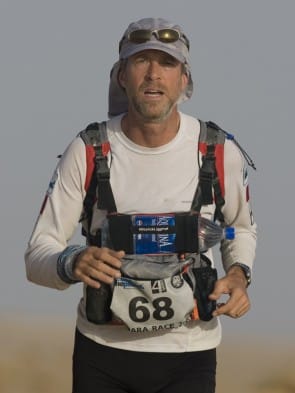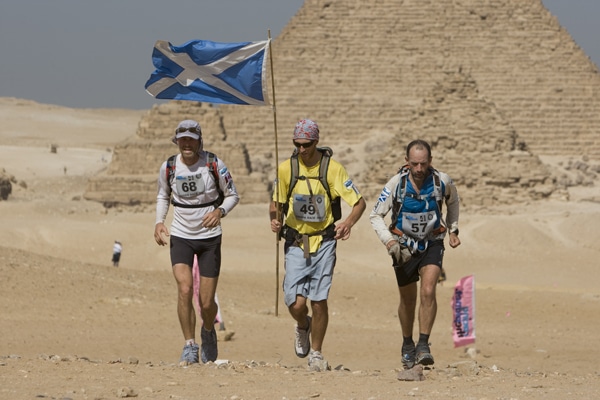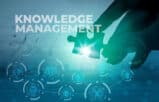Who are these “enterprising lawyers”? Actually, they are easy to spot. Look for the more engaged and happier lawyers in the crowd. Deeply invested in the power of the work they do for their clients, they have ample interests beyond the practice of law as well. And they seem to have more energy for getting things done than anyone in the crowd. You probably know one or two—you may even be one yourself! Meet Mark Tamminga—a large firm partner and practice systems expert who is, quite literally, a law firm innovation leader. That’s him in the photo below, number 68. Just another mellow day.
Mark Tamminga
Gowlings LLP
Hamilton, Ontario, Office
Osgoode Hall Law School/York University (Combined LLB/MBA, 1986)
Calvin College (BA, Philosophy and French, 1980)
Why did you want to be a lawyer?
I didn’t really—in fact, I approached the idea with a good deal of late-70s skepticism. But law school is the great elephant burial ground of humanities students who don’t want to go to grad school. I knew I had to do something and I didn’t feel ready or willing to go out and get an actual job. Law school was really just the path of least resistance. Just to prolong the experience—baffling, but fortuitous, in retrospect—I jumped into the combined law/MBA program midway through my first year.
What is the focus of your law practice?
Mortgage enforcement. It’s not what anyone grows up wanting to do, particularly not someone who grew up in a family devoted to public service. But when I joined the firm as a student in 1986, I was drawn to the area because of its pioneering use of early information technology. The practice at the time was run by Bill Walker, who is still with it today. He was one of the first to use Xerox Memorywriters in a law firm and he recognized in me an aptitude for systems.
I was a bit flip as a student, and so didn’t expect to be hired permanently by the firm, but Bill insisted I be offered a position in his highly successful practice. That success meant that he had the resources needed to disguise me as a fully productive young lawyer. But my real job as a first-year lawyer was to do whatever I could to find new ways to systematize the production environment for mortgage files. It was an actual, real live skunk works.
I had had my first exposure to computing while getting my MBA. I actually wrote my Master’s thesis online using a DEC VT52 “video terminal” (the one of the first devices that could actually handle upper and lower case). I did the whole thing over the phone with an acoustic coupler and a 300-baud modem. This was crazy science-fiction-level stuff at the time.
Coincident with my start in practice, Toronto-based ExperText Systems came out with software that promised to remove much of the drudgery from real estate transaction work by combining a basic database with document assembly. These tools turned out to be readily adapted to a mortgage remedies context. I started working with ExperText’s Doug Simpson on the design of a system that was adapted to mortgage remedies files in Ontario, which we implemented in late 1989.
My initial plan was to play with software for a year and then make a pitch to move to a less emotionally wrought practice. But having motorized the portfolio, it fell to me to help run the operation. I’ve never left.
What is the real reason clients hire you?
I don’t really see myself as being hired personally by clients. They hire the group and the methodology. It’s more an institution-to-institution relationship. A lender will hire Gowlings to handle a continuous flow of files in a portfolio of work. We work hard on the marketing side, but the market is largely stable now and so it’s all about service delivery—and it’s even more about keeping clients. Once the portfolio commitment is made, it is up to us to manage that flow effectively and fairly. It’s really more a production system view of the world. The software I developed over the years (the machine tools) are key in that regard. They provide clients with real-time online access to the work in progress on their files—reporting letters are extinct in our practice because they’re redundant. At the same time, the lawyers and clerks on our side have a complete and instant command of the thousands of active matters in the system. That mastery of the data and the ready accessibility of our people have proven very effective in keeping clients happy and convincing new lenders to commit to us.
But nothing beats good old-fashioned domain expertise. Working with me in this practice are a group of really smart lawyers and clerks who are highly regarded by clients and opposing counsel alike. Clients know that we have a first-rate operation that neatly combines top practitioners with exceptional systems.
Who was your most important mentor and, briefly, what did he or she teach you?
Bill Walker—and his mentor Harry VanderLugt. Both are still with the firm, though nearing retirement, and I have had the privilege of making the transition from being their most junior of juniors to a peer and a friend. Both understood deeply what it was to deliver value to a client—as defined by the client and not by we mere lawyers. Key here was to see that value was measured in results and not time spent. They insisted that the best lawyers came through for your client no matter what, and they never dropped the ball. Bill and Harry both came from modest circumstances and demonstrated by example that the best approach to practice required simplicity, humility, practicality and a deep understanding of the law.
Harry also introduced me to the world of competitive athletics. He was one of the best master rowers and skiers in Canada and, with his encouragement, I became a runner. Through running, I met my remarkable wife—we were racing against each other on three person teams in an orienteering event; it came down to a sprint to the finish, which my team lost. I thought, who is this woman?
What about practicing law did you learn the hard way?
That you’re going to make mistakes. Especially in a high-velocity practice. And that the mark of a good lawyer is not that mistakes occur, but how they are handled. Hit the red button as soon as the issue surfaces. Be forthright. Don’t hide anything. Face the facts.
What is your favorite technology tool?
GhostDraft. It’s a document assembly program built by a company in South Africa called Korbitec. I’m just getting up to speed on it now, but it’s just plain cool. It’s built on XML and is server-based so it’s inherently web-enabled. Web-enabled document assembly has huge potential for any number of practice areas.
Recreationally, my favorite technology tool is a social network for orienteers and endurance runners called Attackpoint. It has a feature that allows heart rate, speed, altitude and GPS data to be automatically pulled into the logged workout from, say, a Garmin Forerunner watch. The GPS data is automatically synched with Google maps, which, when you see it for the first time, is ridiculously amazing.
What is your favorite non-technology tool?
Aren’t all tools, by definition, technological? Okay, okay. My stainless steel-insulated coffee mug. I’ve had it for 15 years.
How would you describe the location and décor of your office?
One of the more satisfying things I’ve done in my career is manage the renovation of our office. We occupy all of what used to be the Bank of Montreal’s main branch for Southern Ontario. The last stone was placed in June 1929—a time when bank resources were, effectively, infinite. It’s a lovely structure, with a 40-foot high great hall, coffered ceilings, Turkish marble pillars and Tennessee marble walls. It was targeted for demolition before we agreed to make a law office out of it. Through the renovation, it was the building that ate my life, but the process of bringing that gracious structure back to life was a labor of love.
My office is on the fourth floor and it opens onto a balcony. On my desk I have a lava lamp that’s a good 3 feet high. I fire it up for special occasions. I also have a shallow box, about 1 foot square, filled with sand, which I call the beach. Over the years people have contributed to the contents of the beach. I’ve got batman, shark’s teeth, the Flintstones and, disturbingly, some coffee beans in there. There’s also a tiny rake someone brought in that visitors use to rearrange the sand.
Why would someone describe you as “enterprising”?
I’m not a natural fit for the job-shop/bespoke approach to law practice that is the norm in large law firms. It’s easy and safe to sell hours, but I’ve been fortunate in that I haven’t had to practice that way. I’ve never entered a time docket. To me it’s good and proper to think of my practice as a business and to apply manufacturing metaphors (cost of production, work flow, machine tools) to the files that clients entrust to us. If I create a legal document for which we charge a fixed fee of $1,200, well, that’s the cost of, say, a refrigerator. It’s not a valid question to ask how long it took to build the refrigerator. Most clients like, and many now demand, that kind of predictability and certainty. And because I don’t record time, I’m more available to clients and the tending of the client relationship.
We provide clients with as much high-level reporting information as we can concoct. With 20 years of data in our database, we are able to extract aggregate information that shows trends that the client itself may not be able to discern. Portfolio-level reporting (how many files are new this month? how many days on average did it take us to conclude each matter? what are average legal fees and disbursements per file over the past month/year/five years?) is very attractive to clients; so report building is a skill I’ve honed over the past decade. (I particularly like the graphical “view” builder in SQL Server Management Studio.)
What is the first thing you “check” each morning?
The temperature outside so my wife and I will know what we face for the dog walk or run that we do first thing. Email comes next, and because I try to live with one email address it’s not all just business. Family and friends send email to my one address and so it’s a pleasant few minutes to see what happened over night. I then read the Toronto Globe and Mail and the New York Times online over breakfast. And Wired. Because Wired is still cool.
Where do you think the practice of law is going?
I don’t think there’s any such thing as the practice of law. The field of law practice is really a category of disparate businesses that are as different one from the other as architecture is from engineering. I think the partnership model as a large law firm business vehicle is in serious trouble. Having hundreds of owners involved in the decision-making process bogs things down badly. Distributing all the profit at the end of a year also bogs things down badly. Those two things together mean trouble in a world of extraordinary change. Smaller, more nimble vehicles with more focused command and control structures and the ability (and desire!) to make significant capital investments hold a large advantage over law partnerships. What success we lawyers still enjoy is largely a factor of the market monopoly we hold and cannot fairly be attributed to any form of business acumen.
Where are you going?
Gowlings, as part of its five-year plan, has committed to becoming known as and actually being a highly innovative large law firm. With my four-year stint as Managing Partner of our office in Hamilton at an end, the firm has asked if I would take a leadership role in making our innovation aspirations actually become something real. It’s a daunting prospect. But over the past few years there has been enough success with novel service delivery platforms that our most senior lawyers recognize that we need to give this some real energy. This is not a role that would have had any hope of success five years ago, but a severe economic crisis and ongoing economic uncertainty tend to concentrate the mind. So there seems to be a real appetite at the firm to look at law practice differently.
So, in addition to my ongoing practice responsibilities, I will be looking for ways to foster innovation at the firm. At first instance, I’m sticking to a project focus by looking for and fostering innovation initiatives and implementing cool new tools. My hope is that we’ll find some early successes that feed momentum so that, in time, we look around and go, hey, we actually have an innovative culture—look at all these cool and client-centric things we do—and it just kind of snuck up on us. Maybe that’s the easy way out or overly optimistic, but the alternative is like being asked to boil the ocean.
What are people most surprised to learn about you?
That I have had considerable success at multi-day stages races over the past 10 years. My wife, Joany, ran 100 miles on her 40th birthday and turned me into an endurance runner (with ample help from our dog, Strider). We ran the Marathon des Sables in Morocco about eight years ago. It’s a 250km foot race in the Sahara run over seven days. The organizers provide a marked course through the desert, tents, water at checkpoints and medical support. Runners have to carry all their own kit, including food for the week, night gear and emergency flair. (Joany is one of the best gear people on the planet and consistently gets her pack to just 7 kilos; mine is 8 kilos because I need more food.) To my astonishment I came 60th out of 800 runners. Two years later I won the Racing the Planet’s Atacama Crossing and the following year the Gobi March. Joany and I have now run 10 of these and find it an amazing way to travel the world. My colleagues watch in appalled fascination.
What do you use every single day that you could actually easily do without?
Pocket change. I wish it would just stop. Coins are so 20th century. At least get rid of the penny. Come on, what’s the point of a penny?
What three things must you always have in your brief bag, desk drawer or refrigerator?
I don’t have a brief bag, but I have a laptop backpack that comes in handy. That bag always has to have a network cable in it. Just in case. I just looked in my desk drawer and there’s really nothing in there I care about. The things I need to run my desk are all on the desk.
Where do you turn when things go really badly?
Joany. We met later in life and got married when I was 45 and she was 40. Neither of us had children and neither of us had been married before. We share a commitment to athletics and are remarkably suitable travel partners. She is wise where I am at a loss. Her compassion and understanding of people helped me enormously when I took on management responsibilities. A practice focus can be all about business, but management in a law firm gets into some really squishy human stuff that, in my mind, I was largely ill-equipped to handle responsibly. She gave me the confidence to be forthright and steadfast and fair and honest. And she taught me that kindness is the engine of good karma. When you have someone like that at your side, things just don’t go badly. They may go sideways, but there’s always a way to nudge them back onto a productive course.
______________________________________________________
More About Mark Tamminga
Mark is a partner at Gowlings LLP and was Managing Partner of the firm’s Hamilton office from 2008 to the end of 2011. This year he took on the role of Leader of Innovation Strategies. As he puts it, “Because I’ve spent my career working with, in and around software and practice systems, that made me, in the eyes of the firm, the ‘innovation guy.’ I had been banging on that drum for some years in any event and so the Gowlings leadership team decided that I should take on the role officially. The title is my invention and is intended to moderate expectations. Innovation as a standalone concept is just too mushy.”
We are always looking for enterprising lawyers. If you’d like to suggest someone to profile, send information to merrilyn@attorneyatwork.com.
More Enterprising Lawyer Interviews on Attorney at Work
- Enterprising Lawyer: Greg Siskind
- Enterprising Lawyer: Stephanie Kimbro
- Enterprising Lawyer: Steve Harhai
Illustration ©ImageZoo.
Photos courtesy of Mark Tamminga.
























